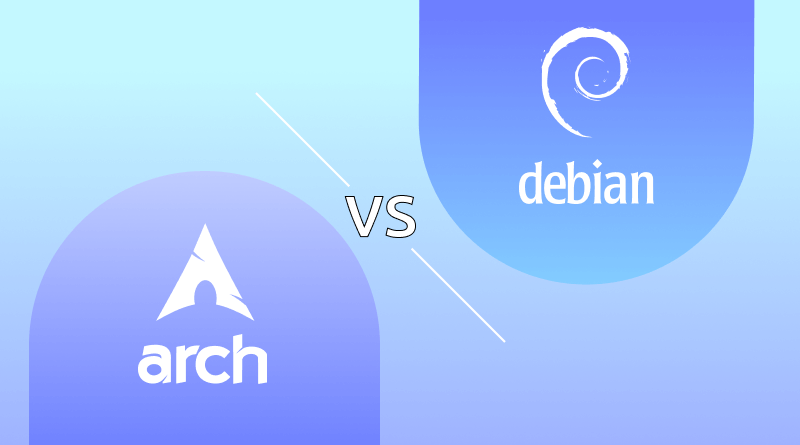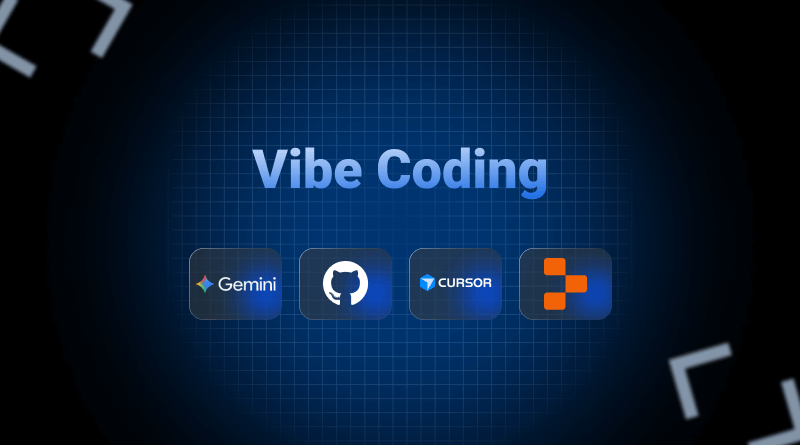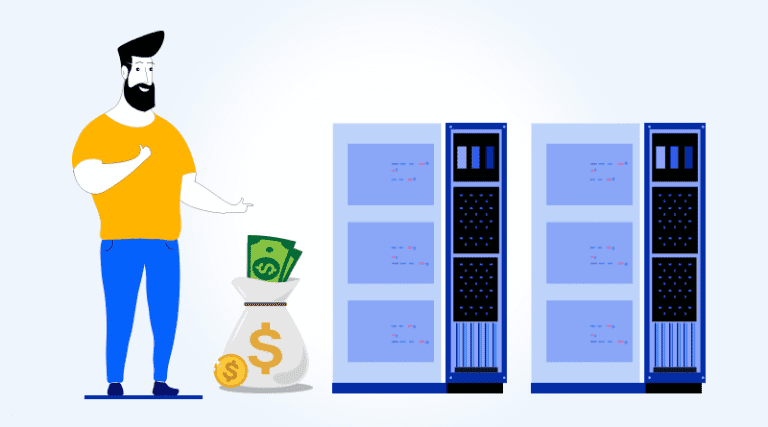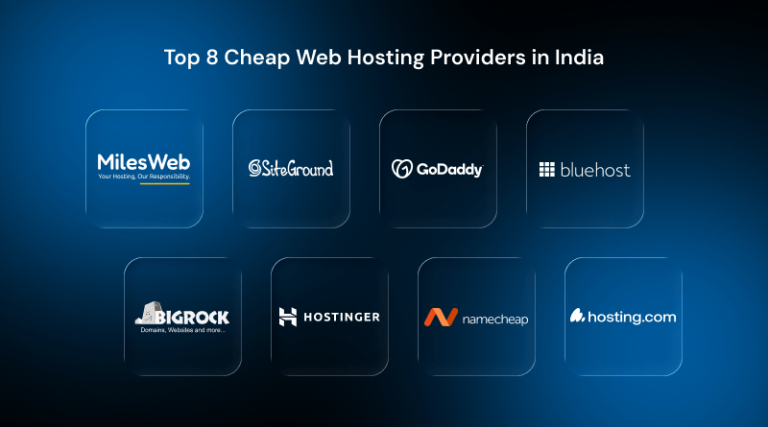Linux is a popular server operating system. That is why, over 96% of the top 1 million servers worldwide which include, Google and Microsoft servers also, highlight its monopoly in the market. This is why our web hosting servers are mostly compatible with Linux OS. Different Linux operating systems offer choices customized for different users. Debian and Arch Linux we have decided to cover in this guide.
As we will explore further in this guide, we will shed light on their histories, pros and cons. Also, there are information which signifies the Linux importance in this digital era. But before that, we would like to convey that if you are looking for a web hosting server compatible with the system, Linux VPS hosting services are the right option for you. Coming back to the topic, let’s illuminate the key differences between Arch Linux vs Debian.
Table Of Content
What is Debian?
Debian, often called the “universal operating system,” has a strong reputation in the Linux industry segment. It was launched in 1993, and since its inception, it is free and open-source distribution. Debian is one of the best Linux distros which assures stability, integrity, and community-driven development.
Undoubtedly, Debian’s influence is higher, and thus 80% of Linux users prefer this distribution. It gives versatile features for beginners and professionals. Let’s decode the key features of the Linux distro in-depth.
Key Features of Debian
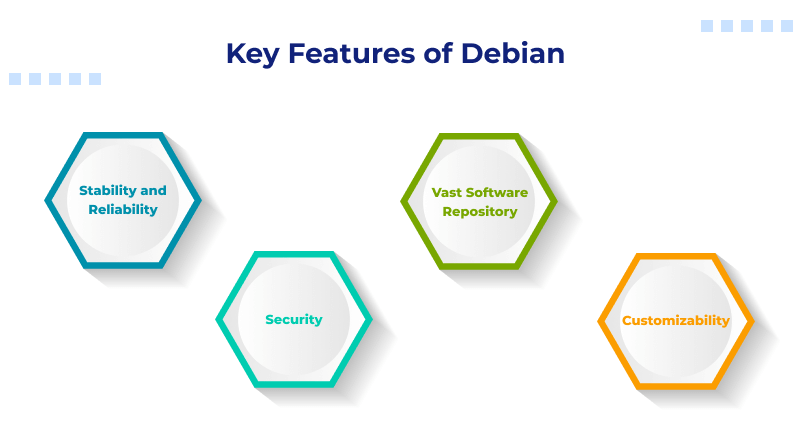
1. Stability and Reliability
Debian is well-known for its rock-solid stability. It is one of the major reasons why developers and system admins trust this operating system for critical applications. Debian goes through extensive testing, making it less prone to crashes or bugs, even in the longer term usage. If you’re looking for an OS that will keep running without issues, Debian is your go-to.
Moreover, Debian’s stability makes it a great choice for servers, as it can operate without frequent reboots. This quality is a huge benefit for businesses that rely on consistent uptime. It’s also one of the reasons Debian is often used as the base for other popular Linux distributions.
2. Security
Security is an another strong character of the Debian. The developers behind it take the security factor seriously. Hence, the OS gets updates regularly with relevant security patches and updates. It ensures that vulnerabilities are acknowledged quickly. Also, it helps to protect your system from potential attacks.
Debian’s extensive repository also includes a wide variety of secure packages. With Debian, you can rest assured that you’re running an operating system built to be secure, making it an ideal choice for environments where data protection is a priority.
3. Vast Software Repository
Debian offers access to one of the largest software repositories available. It means you can find almost any application you need without much hassles. The APT package management system makes installing, updating, and removing software a breeze, simplifying the entire process for users, even if you’re new to Linux.
Because of this, Debian is highly versatile. Whether you’re setting up a server, using it for development, or even daily desktop tasks, you’ll find plenty of options to suit your needs. The availability of both free and non-free packages gives you the flexibility to choose between open-source and proprietary software.
4. Customizability
One of the best things about Debian is how customizable it is. Whether you want to tweak the desktop environment, modify system settings, or build custom applications, Debian gives you full control over your system. You can customize it precisely to fit your personal or professional needs.
This flexibility makes Debian perfect for both beginners and power users. If you’re just starting, you can run it with the default settings. But if you’re more experienced, you’ll appreciate the ability to configure Debian down to the finest detail.
What is Arch Linux?
Arch Linux is one of the unique rolling-release Linux operating systems. It is customized for experienced users, it promotes simplicity and full customization. Unlike other distributions, Arch provides a minimal environment, letting users shape their strategies. However, this approach requires a deeper Linux understanding.
Those seeking hands-on experience choose Arch to sculpt their ideal computing environment. There are several advantages of this operating system. But before that let’s decode the features of Arch Linux. After reading it you will understand why developers prefer Arch Linux too.
Key Features of Arch Linux
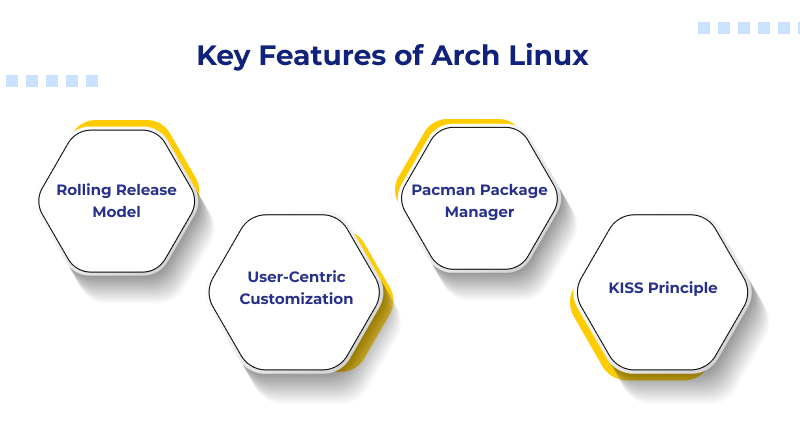
1. Rolling Release Model
One of the best features of Arch Linux is its rolling release model. It means the operating system offers continuous updates to users. So, there is no additional technical burden on them to install updates regularly. Software in the OS itself will install the bigger version release.
This approach is fantastic for those who love to stay on the cutting edge of technology. You won’t have to worry about your system becoming outdated or needing a complete overhaul. Instead, you can enjoy a fresh and up-to-date experience all the time, making Arch an excellent choice for tech enthusiasts and developers alike.
2. User-Centric Customization
Arch Linux is customization and control. The installation is minimalist: let the users build their system from the ground up. It means you can install only what you need and nothing more, giving you full control of your environment. From lightweight to a more feature-rich experience, Arch lets you shape up your system exactly the way you need it.
In addition, Arch documentation, particularly the Arch Wiki, is surprisingly well-developed. It is useful for users. All of its procedures starting from installation, up to configuration and troubleshooting are very detailed. Ensuring that you have everything you need to customize your system at your fingertips, this community-driven documentation really makes the whole experience worthwhile.
3. Pacman Package Manager
Another important feature in Arch Linux is the package manager, Pacman. This has made it very easy to install updates on your system. Moreover, with Pacman, you can easily search for a package, and also automatically resolve dependencies, and keep the system in sync with the latest updates.
Pacman can also support an impressive number of packages, both official and maintained by the community so you are allowed to choose from among many productivity or game applications or any development tool. Overall effective package manager coupled with a rich repository will make dealing with the software much easier in Arch.
4. KISS Principle
Arch Linux embraces the KISS principle—”Keep It Simple, Stupid.” This philosophy emphasizes simplicity and minimalism, which is evident throughout the entire system. By avoiding unnecessary complexity, Arch allows users to have a clear and efficient setup that is easy to understand and manage.
This focus on simplicity also means that Arch users can dive deeper into the workings of their system. If you enjoy learning and tinkering, Arch is a fantastic platform to explore. It encourages a hands-on approach to Linux, making it not just an operating system but an educational experience that helps you become more proficient with technology.
Key Comparison: Arch Linux vs Debian
| Feature | Arch Linux | Debian |
| Rolling Release | Yes | No |
| Package Management | pacman | apt |
| Default Desktop Environment | None (user-chosen) | GNOME (optional) |
| Target Audience | Experienced users, developers | Beginners, intermediate users |
| Philosophy | Do-it-yourself (DIY), flexibility | Stability, reliability |
| Update Frequency | Frequent, continuous updates | Regular, planned releases |
| Community Support | Strong, active community | Large, supportive community |
| System Configuration | Manual, granular control | More automated, user-friendly |
Do you want additional differences between Arch Linux vs Debian? Here are some additional pointers to support our insights.
1. Ease of Use
Debian offers a more streamlined user experience. It comes with pre-configured settings, pre-installed software for the daily tasks, and focuses on stability. It offers lots of GUI tools for system management which is excellent for beginners or those who like the “it just works” approach.
The learning curve for Arch Linux, however, is steep. With its ‘do-it-yourself’ philosophy, you usually have to set up and configure the software from scratch, which means it’s more complex. It’s more suited for those enthusiasts and users who want granular control over their system.
2. Package Management
Debian deploys APT (Advanced Package Tool) and has a structured repository system categorized as Stable, Testing, and Unstable. Its structure helps deliver reliable software while accommodating those who want a cutting-edge option.
Arch Linux leverages Packman as the package manager with a rolling release model. It ensures users frequently get the latest software versions. Also, the AUR (Arch User Repository) is a massive community-driven repository.
3. Security
Debian prioritizes security by implementing a stable release model, prompt security updates, and tools like SELinux and AppArmor. This comprehensive approach ensures resilience against vulnerabilities and shields users from potential threats.
Arch Linux emphasizes user-controlled security, providing the necessary tools but entrusting the responsibility of secure configuration to the users. The rolling release model and access to the latest security tools via the AUR enable users to enhance their system’s security as they prefer.
4. System Configuration
Debian uses a conventional configuration approach, with a utility that helps in adjusting configurations without manual file editing.
In this way, the process is simplified for new users while maintaining depth for more advanced users. In Arch Linux, users must edit files and scripts in the /etc directory themselves. For novices, this provides maximum control and flexibility.
5. Customization
Debian offers a balance between out-of-the-box usability and customization, providing a pre-configured setup with various desktop environments available for customization.
Whereas, Arch Linux embodies the higher customization starting with a minimal base system and allowing users to build their environment from the ground up. The users can handpick each component of their system, ensuring that no unnecessary packages or services run on the system.
Who Can Use Debian?
- Beginners and Everyday Users: Debian has a smooth user experience for anyone diving into Linux. Hence, there is no steep learning curve for beginners. Tools like GNOME, KDE, and XFCE make navigation intuitive.
- Server Administrators and Enterprises: Debian’s package manager APT provides a robust system for software handling. It is also a secured distro that brings valuable results.
- Open Source Enthusiasts: There is a massive community of passionate developers who shape Debian for continuous enhancement.
Who Can Use Arch Linux?
- Experienced and Advanced Users: Arch Linux is configured for those familiar with Linux distro. Users with a penchant for micromanagement find Arch to be their playground. Arch often requires troubleshooting.
- Cutting-Edge Software Enthusiasts: Professionals who seek to develop cutting-edge software and applications prefer Arch Linux as a Linux distro.
- Flexibility Seekers: Arch Linux users have the freedom to build their setup from scratch. Also, they can choose the development environment from ranging from GNOME to KDE.
In conclusion, the choice between Debian and Arch Linux depends on your preferences, needs, and experience level. Debian, with its stability, security, and ease of use, is an excellent choice for users seeking a reliable, long-term solution. It offers a vast repository of tested software, making it ideal for beginners, businesses, and users who prioritize consistency in their systems.
On the other hand, Arch Linux appeals to more experienced users who enjoy customizing every aspect of their system. Its rolling release model and minimalist approach provide the flexibility to shape your system exactly how you want it. If you prefer cutting-edge software and don’t mind frequent updates, Arch Linux could be a rewarding challenge.
Ultimately, both distributions offer distinct advantages. Debian is a solid, dependable choice for users seeking stability and ease of maintenance, while Arch is perfect for those who want complete control over their system. Consider your technical comfort level and specific use case to determine which distribution best aligns with your goals.
FAQs
Which is better for beginners: Arch Linux or Debian?
Debian is generally considered more beginner-friendly compared to Arch Linux. With its stable releases and extensive documentation, Debian offers a straightforward installation process and is easy to maintain. It comes with a wealth of pre-packaged software, making it a solid choice for users new to Linux. Arch Linux, on the other hand, is more suited for experienced users due to its manual installation process, minimalistic approach, and rolling release model, which can be more challenging for beginners to navigate.
What are the main differences between Arch Linux and Debian?
The primary difference between Arch Linux and Debian is their approach to stability and customization. Debian focuses on providing a highly stable environment, ideal for users who prefer reliability over the latest features. It uses a fixed release model with long-term support. Arch Linux, by contrast, follows a rolling release model, offering the latest software updates as soon as they are available.
Can I use Arch Linux or Debian for servers?
Both Arch Linux and Debian can be used for servers, but Debian is the more popular choice due to its stability, security, and long-term support. Debian’s focus on stability makes it a reliable option for server environments where uptime and security are crucial. Arch Linux, while highly customizable, may not be ideal for servers because of its rolling release model, which can introduce the risk of instability with frequent updates.
Which distribution offers better software availability: Arch Linux or Debian?
Both distributions offer extensive software availability, but they approach it differently. Debian has a massive repository of software that is thoroughly tested for stability, making it a go-to choice for users who want a dependable system with well-maintained applications. Arch Linux, however, provides access to the latest software through its repositories and the Arch User Repository (AUR), which includes community-contributed packages.

